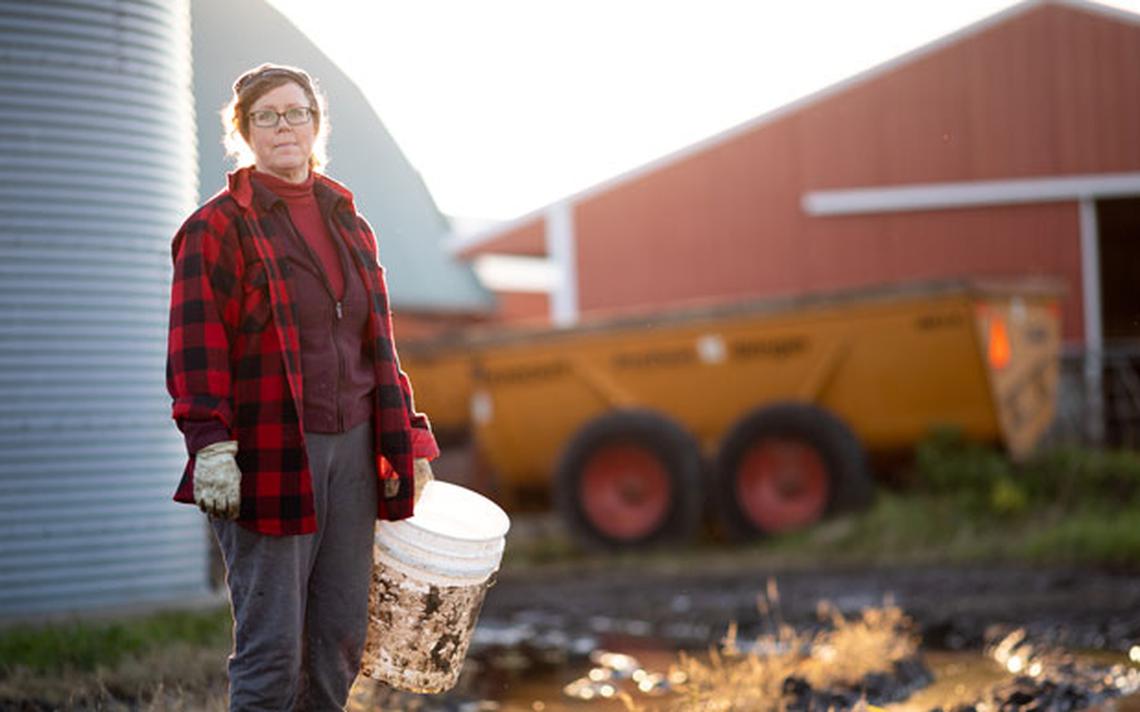Moynihan understands farm stress. She and her husband operate a small dairy farm near Belle Plaine. For a period of time, she had to take a leave of absence from her job to step in and run the dairy operation herself at a time that is proving particularly challenging.
Last year, 10 percent of Minnesota dairy farms went under, and a similar number are expected to fail this year — just one troubled sector in an agricultural economy under stress from chronically low prices, rising costs and trade disputes, among other factors.
“It is a storm and I think people feel really battered,” Moynihan said.
The Moynihans lost a buyer for their organic milk, plunging their operation into chaos. Moynihan’s health began to decline under time pressures. After nine months, the couple found a new buyer.
Although emerging from the crisis, Moynihan asked to help the department develop programs and resources to help struggling farmers, including the Minnesota Farm and Rural Helpline.
Farmers and farm families need a wide array of advice — financial, banking, legal, physical, as well as mental and emotional health.
“These stresses are so real and they are so pervasive,” she said.

Farmers and ranchers, who pride themselves on being independent and resourceful, are reluctant to seek help.
“They say to themselves, ‘I’m going to buck up and make it work,’” Moynihan said. “It mounts.”
That’s especially the case in a farm that has been in a family for generations. Farmers feel the weight of previous generations and feel responsible for passing the farm along to the next generation, she said.
Lutheran Social Services recently created a new program under its Abound Counseling service to help farmers and ranchers cope with stress.
The program is run by Becky Kopp-Dunham. As with Moynihan, Kopp-Dunham also has a connection to farming. She and her husband farm near Hawley.
Counseling services for farmers and farm families are available over the phone and online to make it easier for people to access help, she said.
“Telehealth helped us branch out,” Kopp-Dunham added. “We’re in the early stages of getting the word out.”
The delayed start of planting due to the cold, wet spring weighs heavily on farmers. “We’re hearing of the stress and the urgency to get in the field,” she said.
Financial difficulties for a farmer put more than livelihood at risk, making the emotional toll greater.
“People view farming as a job, and it’s not a job,” Kopp-Dunham said. “It’s the loss of a culture and a way of life, likely for generations. It’s a completely different level of stress and pressure than just losing a job.”
Pressures build over a succession of tough financial years due to chronically low prices. “It compounds over the years and it becomes more than they can absorb.”
Ted Matthews, who counsels farmers with support from the Minnesota Department of Agriculture and colleges, has been working with farmers for more than 25 years.
“I’m not only getting more calls,” he said. “I’m hearing more desperation. They don’t know what to do.”
The problem is that so much is beyond their control: farm policy, trade policy, monetary policy, the weather, global commodity markets.
“Working harder is not the answer,” Matthews said. “Working better is not the answer. It’s beyond their control.”
Matthews, who describes himself as a crisis interventionist, finds himself getting angry at national politicians who he believes have failed to respond to the growing problems in farm country.
“The consequences of their not doing things, I hear,” he said.
Often, Matthews finds himself trying to prevent suicides. For every person who succeeds, he said, another 25 try to take their lives.
“Sometimes suicides are identified as farm accidents,” he said. “If you have insurance and your debt load is high … sometimes that happens.”
Today’s farm families face pressures earlier generations didn’t, Matthews said. Now it’s common for wives to work off the farm, especially to provide health insurance for the family and to reduce debt.
It’s also more common for wives to help out on the farm, in the field or as bookkeepers. “They have their own opinion now,” he said.
That adds sources of conflict. “So there’s more need to communicate and less time,” Matthews added. “It’s absolutely true that two heads are better than one. But which one is going to prevail?”
To be effective in helping farmers, counselors must truly understand how farmers think, what’s important to them, and farm culture, Matthews said.
Although farmers are becoming more open to accepting help and guidance, Matthews often hears from farmers through an intermediary, such as a trusted friend or neighbor, clergy member, lawyer or banker, a network that has developed over the years.
Resources to help cope with farm stress